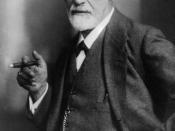John Ciardi was trying to come to terms with survival, mortality, death and killing through his literary endeavors - his diary and poems - which give an insight into his inner thoughts and fears. "Saipan," Ciardi's war diary was written in 1944-45. His war poetry collection named Other Skies was published in 1947. He spent three years as an aerial gunner on a B-29. The diary depicts the soldiers, their every day life in the army, the battles, their crew equipment and reveals the poet's feelings of dread and trauma. The journal casts light upon his transformation, as the diary begins, the poet is ignorant, meaningless - a person who actually does not really care what is happening. "I must have slept through the big scare. Either that, or I was too sleepy, or just too ignorant to get decently moved towards survival. Mostly ignorance I guess." He uses comic tone: "No one had ever shot at me before, and I couldn't quite understand anyone beginning to."(pg.
24) This tone of senselessness changes into a vulnerable and terrified human being's memoir and the diary suddenly stops, perhaps he was unable to repress his feelings any longer it must have been too much to bear. The fact that he was a aerial gunner could serve as one of the explanations for his insensitivity that was represented in "Saipan." It seems that distance makes it easier to murder, as they do not have to face the actual death, blood, suffering and the fear in the eyes of the enemy - all they need to do is release bombs from the sky. Ciardi's themes in both his diary and his war poetry reflects this assumption; he does not deal with topics as depiction of the enemy and their agony,


